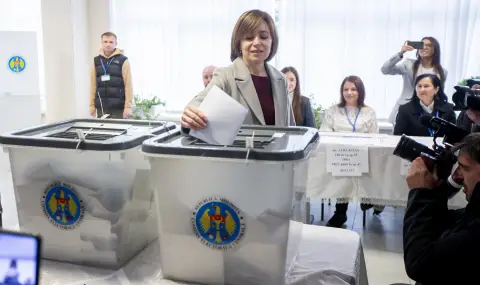On the evening of October 20, shortly after the end of the EU referendum and the first round of the presidential elections, the President of Moldova, Maya Sandu, came out stony-faced in front of journalists and succinctly said that there was an “unprecedented attack on freedom and democracy in the country”. Electoral fraud has reached “huge scales”, there was an attempt to buy up to 300,000 votes.
Unexpected results
At that moment, it was already clear that Sandu, who takes firm pro-European positions, would win the first round of the elections. But suddenly her pro-Russian rivals received far more votes than the forecasts had predicted. And again, contrary to predictions, tonight it seemed that in the EU referendum, the majority of voters in Moldova voted against the country's European perspective. The next morning, however, the number of EU supporters increased thanks to diaspora votes and won by a narrow margin. But even so, the results were far from the predictions.
Since then, election watchers have been speculating – is Moldova not far more divided into pro-European and pro-Russian camps than previously thought? Or the discrepancy between forecasts and results is really the fault of “unprecedented election fraud”, as Maya Sandu pointed out.
Hybrid Warfare Test Ground
Meanwhile, the answer is clear: it is about electoral fraud not only on a large scale, but also with methods never used in Europe before. This was revealed by the investigations presented to the public by the Moldovan police. They show that the country has become a testing ground for a Russian-led hybrid war. And what happened in Moldova shows what could happen elsewhere.
According to the head of the Moldovan police inspectorate, Viorel Cherneutsianu, a criminal group around the Moldovan-Russian businessman Ilan Shor, who lives in Russia, has involved 138,000 Moldovan citizens in a vote-buying network since April 2024. Those involved were found to have accounts at Russia's Promsvyazbank, considered a Russian defense industry bank that had been subject to Western sanctions even before Russia's invasion of Ukraine.
Through a special mobile application, network participants had access to the money in the accounts with which they paid for the votes. The price is also known – about 100 euros for a vote in favor of one of the pro-Russian candidates and against the integration of Moldova in the EU.
Ten percent of voters in the country were bought
The money was disbursed by “local coordinators”, who had to first establish whether the relevant people had voted as agreed. The evidence was provided through photographs of the ballots. Moldovan police have documented around 1.4 million transactions from the Russian bank's app to Moldovan residents. Most of the money was transferred in the weeks before the vote: a total of $39 million.
It is believed that alongside the known 138,000 “recipients” of the money from Promsvyazbank, between two and four other people, probably members of their families, are connected to each of them. And it turns out that the number of app users alone corresponds to more than ten percent of voters who voted in Moldova on October 20.
According to Cherneutsyanu, there is no doubt that the vote-buying actions were carried out by members of Ilan Shor's criminal organization. He was sentenced in Moldova to 15 years in prison for the theft of one billion euros from local banks (between 2012 and 2014), but in 2019 he fled to Israel, and since the beginning of 2024 he has been living in Russia. The businessman is on the US and EU sanctions lists and is wanted by Interpol, but Russia refuses to hand him over.
How the mechanism worked
Despite his escape from Moldova, Shor continues his political activity in the country. He has been funding anti-European campaigns for years and paying people to participate in pro-Russian demonstrations in Moldova.
During the current election campaign, Shore's name has been associated with major disinformation campaigns – with a narrative such as the one that the integration of Moldova into the EU will mean getting into a war against Russia on the side of NATO.
According to the data of the Moldovan police, the important technical details of the election frauds were established only a few days before the elections, but this is probably not entirely reliable. Maya Sandu herself said the day after the election that not enough had been done in the judiciary to prevent electoral fraud.
Moldova's chief prosecutor, Ion Munteanu, in turn, accused the Russian secret services of developing the mechanism for buying votes through the bank's app. In addition, experts and specialists from Moldova, who previously worked in the police, court and prosecutor's office, appear to have assisted the implementation of the scheme in the country.
The runoff is coming
On Sunday there will be a runoff for the presidential elections, in which Maya Sandu will once again appear as the favorite. Her rival, Alexander Stoyanoglo, a former chief prosecutor ousted in 2021 on corruption charges, finished well behind in the first round, but could now consolidate the votes of the candidates left behind. In this situation, Sandu's victory may not be easy.
Stoyanoglo benefits from the support of the pro-Russian and anti-European Party of Socialists. He himself did not speak directly against the integration of Moldova in the EU or for formal connection with Russia, but emphasized that Chisinau should have close ties with Russia.
In spite of everything, Maya Sandu has so far avoided accusing Russia of election fraud. She only talks about “bandits“ - apparently hoping in this way to win over hesitant and skeptical voters.
Authors: Vitali Calugareanu, Keno Ferzek
